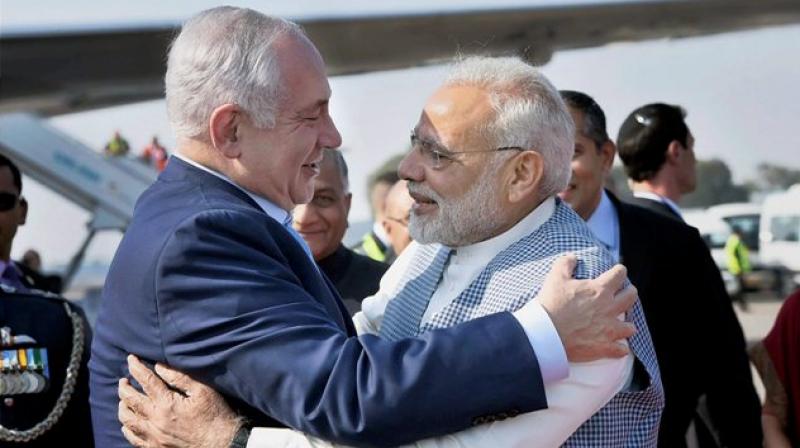Under Modi & Bibi, a deepening relationship
For India, the epicentre is Pakistan, on which Tel Aviv's views are not advertised.

The six-day India visit of Israeli Prime Minister Benjamin Netanyahu, which ends today, symbolises the solidifying of a long-evolving relationship into something more eye-catching under the leadership of Prime Minister Narendra Modi. It is more than evident that there appears to be a perfect match of ideological chemistry between the two leaders, and indeed the cultural traditions and broad perspectives of their respective political parties rooted in a view that looks at Muslims with question marks. This seems an important reason for the big play on the common fight against terrorism, which finds prominent mention in the joint statement signed during the visit. Delivering the inaugural address at the officially-sponsored Raisina Dialogue, the Israeli leader even spoke of an anti-terrorist coalition. On paper, such an idea might make some sense. But there is devil in the detail. For Israel, Iran is the epicentre of terrorism, but India has a strategic partnership with Iran. For India, the epicentre is Pakistan, on which Tel Aviv’s views are not advertised. Another problem is that Israel’s terrorism problem is linked to its grab of Palestinian territories.
Nevertheless, India’s purchase of all kinds of equipment, including weapons and defence hardware, and intelligence-sharing with Israel in order to defend against terrorism may expected to be stepped up under Mr Modi, given his perfect ideological fit with Israel on these key matters. Besides the anti-terrorism vector, Israel has long emerged as a major and long-term supplier of military tech to India. There may be greater impetus to this aspect. Mr Netanyahu was here with 130 businessmen. Much of their attention is likely to be on India’s defence sector. Mr Modi has thrown an open invitation to the Israelis to seize the opportunity to enter the Indian defence market in a big way under the “Make in India” programme.
Israel also appears keen. To further his case, Mr Netanyahu even made the fairly dubious public statement that peace can ensue only from a position of strength, which for him translates to being armed to the teeth. Quite frankly, India isn’t a national security state like Israel, and it would be regressive if Mr Modi sought to take it that way. Besides, being strong means many other things, as Mahatma Gandhi showed us. Of course, the nine MoUs signed during the visit also include agriculture, water, cybersecurity, infrastructure and culture. So there’s an overall package of mutuality that can be explored in each sector under a broad framework. Mr Netanyahu arrived here within six months of Mr Modi visiting Israel last July. However, it is positive that the Indian leader so far keeps alive the idea of supporting the Palestinian cause while being friends with Israel — an idea that has been with us much before Mr Modi.

